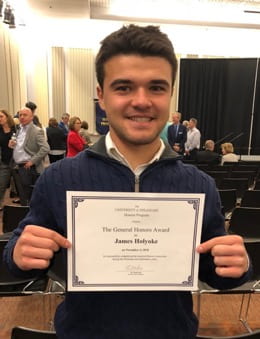Tell us a little about your background
My name is James Holyoke, and I was born and raised in King of Prussia, Pennsylvania. I am a senior majoring in Civil Engineering here at UD, and after I graduate I hope to pursue a graduate degree in Coastal/Ocean Engineering. I knew I wanted to grow up and work with water since the first time I can recall being at the beach, and some of my fondest childhood memories include me learning to fish on my uncle’s boat. I also enjoyed building anything I could, and I hope to one day put these passions together into a career.
Why made you decide to do undergraduate research?
I originally decided to pursue undergraduate research after my freshman year as I felt it was far more interesting than an internship position. Rather than working for a company and potentially doing busy work, I wanted the opportunity to work on something new and innovative. Once I realized my interest in Coastal Engineering, I reached out to Professor Hsu, who was kind enough to give me the opportunity to work with him. The undergraduate research has thus far provided me the opportunity to gain a much greater understanding of the field and to help me learn that I would like to continue on to graduate school in the field.
Describe your research in a few sentences
For my research, I have been studying the role that turbulence plays on flocculation, especially in oil-mineral aggregation. Throughout my senior year, I will be completing an undergraduate thesis in which I will be investigating flocculation evolution rate parameters. I want to better understand how the inclusion of oil can alter flocculation. I will be conducting lab tests in which I hold turbulence constant (either high or medium turbulent kinetic energy) and observe the flocculation evolution rate over a two hour time period. I would like to compare the flocculation rates of different types of sediment with and without the inclusion of oil. Testing thus far has shown that oil can alter flocculation processes and that the first ten to fifteen minutes tend to be the most sensitive.
What do you find rewarding about your research?
I find my research to be extremely rewarding as I have been given the opportunity to work in an area that is still largely unknown, yet relevant to today’s society. I have thoroughly enjoyed the opportunity to look at what happens to oil after spills on a microscopic level, as it is an area of ongoing environmental impacts. It is extremely motivating to know that what I am working on has the potential to help humans make the world a healthier place in which to live.
What do you do for fun outside of your undergraduate studies?
Outside of my undergraduate studies, I enjoy taking part in various research projects, whether it be in the Center for Applied Coastal Research or elsewhere. Furthermore, I enjoy spending my time watching or playing sports and enjoying the outdoors. I am an avid fisherman and will take any opportunity possible to fish. I am also a huge football and soccer fan, and I can be found participating in lots of intramural sports or rooting for my favorite teams.

